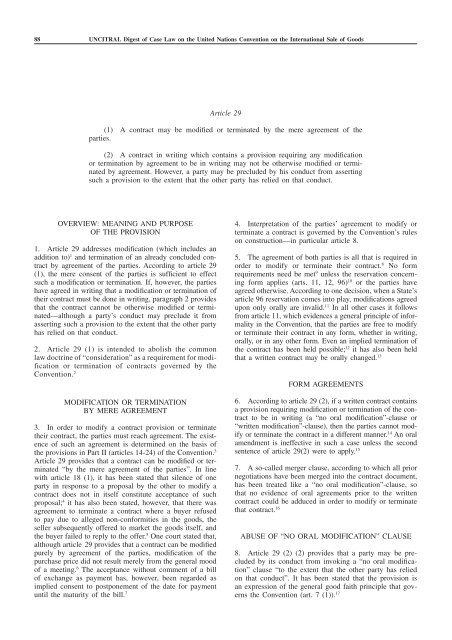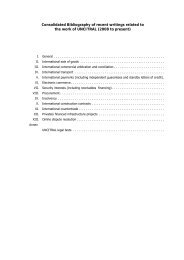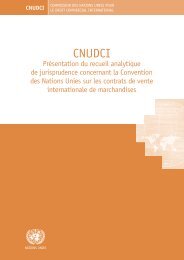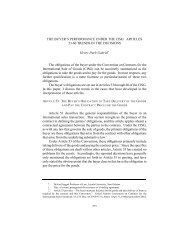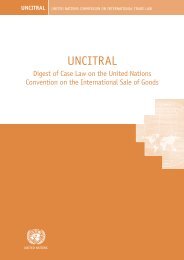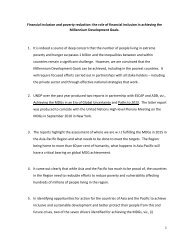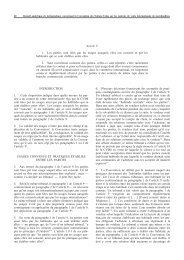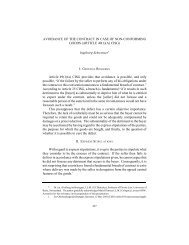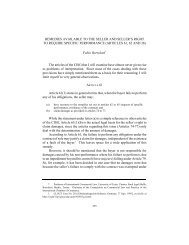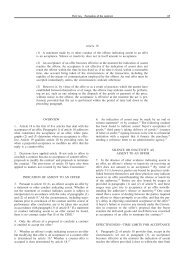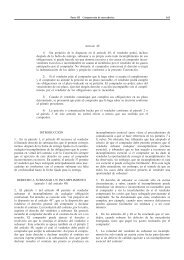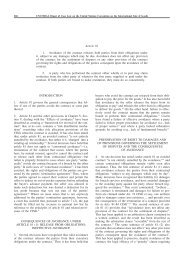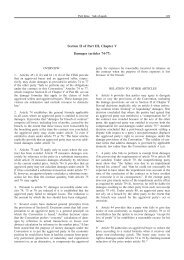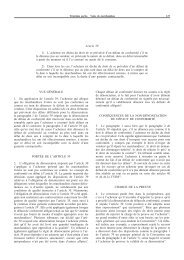Article 29 (1) A contract may be modified or terminated by ... - uncitral
Article 29 (1) A contract may be modified or terminated by ... - uncitral
Article 29 (1) A contract may be modified or terminated by ... - uncitral
You also want an ePaper? Increase the reach of your titles
YUMPU automatically turns print PDFs into web optimized ePapers that Google loves.
88 UNCITRAL Digest of Case Law on the United Nations Convention on the International Sale of Goods<br />
<strong>Article</strong> <strong>29</strong><br />
(1) A <strong>contract</strong> <strong>may</strong> <strong>be</strong> <strong>modified</strong> <strong>or</strong> <strong>terminated</strong> <strong>by</strong> the mere agreement of the<br />
parties.<br />
(2) A <strong>contract</strong> in writing which contains a provision requiring any modification<br />
<strong>or</strong> termination <strong>by</strong> agreement to <strong>be</strong> in writing <strong>may</strong> not <strong>be</strong> otherwise <strong>modified</strong> <strong>or</strong> <strong>terminated</strong><br />
<strong>by</strong> agreement. However, a party <strong>may</strong> <strong>be</strong> precluded <strong>by</strong> his conduct from asserting<br />
such a provision to the extent that the other party has relied on that conduct.<br />
OVERVIEW: MEANING AND PURPOSE<br />
OF THE PROVISION<br />
1. <strong>Article</strong> <strong>29</strong> addresses modification (which includes an<br />
addition to) 1 and termination of an already concluded <strong>contract</strong><br />
<strong>by</strong> agreement of the parties. Acc<strong>or</strong>ding to article <strong>29</strong><br />
(1), the mere consent of the parties is sufficient to effect<br />
such a modification <strong>or</strong> termination. If, however, the parties<br />
have agreed in writing that a modification <strong>or</strong> termination of<br />
their <strong>contract</strong> must <strong>be</strong> done in writing, paragraph 2 provides<br />
that the <strong>contract</strong> cannot <strong>be</strong> otherwise <strong>modified</strong> <strong>or</strong> <strong>terminated</strong>—although<br />
a party’s conduct <strong>may</strong> preclude it from<br />
asserting such a provision to the extent that the other party<br />
has relied on that conduct.<br />
2. <strong>Article</strong> <strong>29</strong> (1) is intended to abolish the common<br />
law doctrine of “consideration” as a requirement f<strong>or</strong> modification<br />
<strong>or</strong> termination of <strong>contract</strong>s governed <strong>by</strong> the<br />
Convention. 2<br />
MODIFICATION OR TERMINATION<br />
BY MERE AGREEMENT<br />
3. In <strong>or</strong>der to modify a <strong>contract</strong> provision <strong>or</strong> terminate<br />
their <strong>contract</strong>, the parties must reach agreement. The existence<br />
of such an agreement is determined on the basis of<br />
the provisions in Part II (articles 14-24) of the Convention. 3<br />
<strong>Article</strong> <strong>29</strong> provides that a <strong>contract</strong> can <strong>be</strong> <strong>modified</strong> <strong>or</strong> <strong>terminated</strong><br />
“<strong>by</strong> the mere agreement of the parties”. In line<br />
with article 18 (1), it has <strong>be</strong>en stated that silence of one<br />
party in response to a proposal <strong>by</strong> the other to modify a<br />
<strong>contract</strong> does not in itself constitute acceptance of such<br />
proposal; 4 it has also <strong>be</strong>en stated, however, that there was<br />
agreement to terminate a <strong>contract</strong> where a buyer refused<br />
to pay due to alleged non-conf<strong>or</strong>mities in the goods, the<br />
seller subsequently offered to market the goods itself, and<br />
the buyer failed to reply to the offer. 5 One court stated that,<br />
although article <strong>29</strong> provides that a <strong>contract</strong> can <strong>be</strong> <strong>modified</strong><br />
purely <strong>by</strong> agreement of the parties, modification of the<br />
purchase price did not result merely from the general mood<br />
of a meeting. 6 The acceptance without comment of a bill<br />
of exchange as payment has, however, <strong>be</strong>en regarded as<br />
implied consent to postponement of the date f<strong>or</strong> payment<br />
until the maturity of the bill. 7<br />
4. Interpretation of the parties’ agreement to modify <strong>or</strong><br />
terminate a <strong>contract</strong> is governed <strong>by</strong> the Convention’s rules<br />
on construction—in particular article 8.<br />
5. The agreement of both parties is all that is required in<br />
<strong>or</strong>der to modify <strong>or</strong> terminate their <strong>contract</strong>. 8 No f<strong>or</strong>m<br />
requirements need <strong>be</strong> met 9 unless the reservation concerning<br />
f<strong>or</strong>m applies (arts. 11, 12, 96) 10 <strong>or</strong> the parties have<br />
agreed otherwise. Acc<strong>or</strong>ding to one decision, when a State’s<br />
article 96 reservation comes into play, modifications agreed<br />
upon only <strong>or</strong>ally are invalid. 11 In all other cases it follows<br />
from article 11, which evidences a general principle of inf<strong>or</strong>mality<br />
in the Convention, that the parties are free to modify<br />
<strong>or</strong> terminate their <strong>contract</strong> in any f<strong>or</strong>m, whether in writing,<br />
<strong>or</strong>ally, <strong>or</strong> in any other f<strong>or</strong>m. Even an implied termination of<br />
the <strong>contract</strong> has <strong>be</strong>en held possible; 12 it has also <strong>be</strong>en held<br />
that a written <strong>contract</strong> <strong>may</strong> <strong>be</strong> <strong>or</strong>ally changed. 13<br />
FORM AGREEMENTS<br />
6. Acc<strong>or</strong>ding to article <strong>29</strong> (2), if a written <strong>contract</strong> contains<br />
a provision requiring modification <strong>or</strong> termination of the <strong>contract</strong><br />
to <strong>be</strong> in writing (a “no <strong>or</strong>al modification”-clause <strong>or</strong><br />
“written modification”-clause), then the parties cannot modify<br />
<strong>or</strong> terminate the <strong>contract</strong> in a different manner. 14 An <strong>or</strong>al<br />
amendment is ineffective in such a case unless the second<br />
sentence of article <strong>29</strong>(2) were to apply. 15<br />
7. A so-called merger clause, acc<strong>or</strong>ding to which all pri<strong>or</strong><br />
negotiations have <strong>be</strong>en merged into the <strong>contract</strong> document,<br />
has <strong>be</strong>en treated like a “no <strong>or</strong>al modification”-clause, so<br />
that no evidence of <strong>or</strong>al agreements pri<strong>or</strong> to the written<br />
<strong>contract</strong> could <strong>be</strong> adduced in <strong>or</strong>der to modify <strong>or</strong> terminate<br />
that <strong>contract</strong>. 16<br />
ABUSE OF “NO ORAL MODIFICATION” CLAUSE<br />
8. <strong>Article</strong> <strong>29</strong> (2) (2) provides that a party <strong>may</strong> <strong>be</strong> precluded<br />
<strong>by</strong> its conduct from invoking a “no <strong>or</strong>al modification”<br />
clause “to the extent that the other party has relied<br />
on that conduct”. It has <strong>be</strong>en stated that the provision is<br />
an expression of the general good faith principle that governs<br />
the Convention (art. 7 (1)). 17
Part three. Sale of goods 89<br />
Notes<br />
1<br />
See CLOUT case No. 86 [Federal District Court, Southern District of New Y<strong>or</strong>k, United States, 22 Septem<strong>be</strong>r 1994] (see full text<br />
of the decision).<br />
2<br />
See Secretariat Commentary to (then) article 27 (‘overcoming the common law rule that “consideration” is required’) Commentary<br />
on the draft Convention on Contracts f<strong>or</strong> the International Sale of Goods, A/CONF.97/5, reproduced in United Nations Conference on<br />
Contracts f<strong>or</strong> the International Sale of Goods: Official Rec<strong>or</strong>ds, at p. 28, paras. 2-3.<br />
3<br />
CLOUT case No. 120 [O<strong>be</strong>rlandesgericht Köln, Germany, 22 February 1994]; to the same effect see CLOUT case No. 153 [Cour<br />
d’appel, Grenoble, France, <strong>29</strong> March 1995], and CLOUT case No. 332 [O<strong>be</strong>rgericht des Kantons, Basel-Landschaft Switzerland 11 June<br />
1999].<br />
4<br />
CLOUT case No. 120 [O<strong>be</strong>rlandesgericht Köln Germany 22 February 1994]; CLOUT case No. 332 [O<strong>be</strong>rgericht des Kantons Basel-<br />
Landschaft, Switzerland, 11 June 1999].<br />
5<br />
CLOUT case No. 120 [O<strong>be</strong>rlandesgericht Köln, Germany, 22 February 1994].<br />
6<br />
CLOUT case No. 153 [Cour d’appel, Grenoble, France, <strong>29</strong> March 1995].<br />
7<br />
CLOUT case No. 5 [Landgericht Hamburg, Germany, 26 Septem<strong>be</strong>r 1990] (see full text of the decision).<br />
8<br />
CLOUT case No. 176 [O<strong>be</strong>rster Gerichtshof, Austria, 6 February 1996].<br />
9<br />
CLOUT case No. 413 [Federal District Court, Southern District of New Y<strong>or</strong>k, United States, 6 April 1998] (see full text of the decision);<br />
CLOUT case No. 422 [O<strong>be</strong>rster Gerichtshof, Austria, <strong>29</strong> June 1999], Zeitschrift für Rechtsvergleichung 2000, 33.<br />
10<br />
F<strong>or</strong> a similar case see Rechtbank van Koophandel, Hasselt, Belgium, 2 May 1995, available on the Internet at http://www.law.<br />
kuleuven.<strong>be</strong>/ipr/eng/cases/1995-05-02.html.<br />
11<br />
Inf<strong>or</strong>mation Letter No. <strong>29</strong> of the High Arbitration Court of the Russian Federation, Russian Federation, 16 February 1998, Unilex<br />
(abstract).<br />
12<br />
CLOUT case No. 422 [O<strong>be</strong>rster Gerichtshof, Austria, <strong>29</strong> June 1999], Zeitschrift für Rechtsvergleichung 2000, 33.<br />
13<br />
CLOUT case No. 176 [O<strong>be</strong>rster Gerichtshof, Austria, 6 February 1996] (see full text of the decision).<br />
14<br />
ICC Court of Arbitration, Switzerland, March 1998, ICC International Court of Arbitration Bulletin, 2000, 83.<br />
15<br />
CLOUT case No. 86 [Federal District Court, Southern District of New Y<strong>or</strong>k, United States, 22 Septem<strong>be</strong>r 1994].<br />
16<br />
ICC Court of Arbitration, Switzerland, March 1998, ICC International Court of Arbitration Bulletin, 2000, 83.<br />
17<br />
CLOUT case No. 94 [Arbitration-Internationales Schiedsgericht der Bundeskammer der gewerblichen Wirtschaft–Wien, 15 June<br />
1994].


